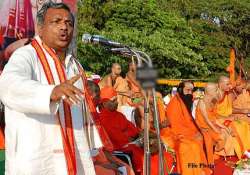Why VHP thinks that 'Ghar Wapsi' complements Modi's development agenda
New Delhi: Burqa-clad Muslim girls with limited education and boys of the community "who become terrorists in madrasas" would benefit from the "Ghar Wapsi" (homecoming) campaign once they come into the Hindu fold, Vishva Hindu

New Delhi: Burqa-clad Muslim girls with limited education and boys of the community "who become terrorists in madrasas" would benefit from the "Ghar Wapsi" (homecoming) campaign once they come into the Hindu fold, Vishva Hindu Parishad (VHP) national spokesperson Surendra Jain has said.
Terming it as "complementary" to Prime Minister Narendra Modi's agenda of national development, Jain said Muslim boys would become patriots if they embraced Hindu religion by way of "homecoming", a rite performed to welcome converts back into the fold.
"Ghar wapsi will affect Modi's development agenda in a positive way. Muslim girls who don't have access to education and are in burqa, once they become Hindu and get educated, will contribute to the country's growth story," Jain, retired professor from Haryana's Rohtak College, told IANS in an interview here.
Upon becoming Hindus, the "Muslim boys, who become terrorists in madrasas, will become 'desh bhakts' (patriots) and will contribute to national development," requiring the union government to spend no money in combating terrorism, Jain reasoned.
Ghar wapsi, or homecoming, integral to the VHP's core social services since its inception in 1964, is an expression coinced for rec-conversion "for those Hindus who were either forced to convert or were lured into adopting a different faith", Jain explained.
Claimed as "legal", a series of "homecoming" ceremonies are being organized across the
country for those who had roots in Hinduism but "drifted" into other religions and would now like to voluntarily "return home".
"About 90-95 percent of Chirstians and Muslims in India were originally Hindus as their forefathers or they themselves were either forced or lured into conversion. Now we are only trying to reconnect them with their roots and the land. We want to rekindle their attachment with their land and bring them back," Jain said.
As part of the VHP's yearlong golden jubilee celebrations, Fatehpur district, the constituency of controversial union minister Sadhvi Niranjan Jyoti, will witness a series of 'Ghar Wapsi' programmes from Jan 14 to Feb 16 next year. In Gujarat last week, a batch of over 200 tribal Christians were "brought home" after performing certain Hindu rituals.
Similar reports have come from Kerala and other parts of eastern Uttar Pradesh where over 100 Muslims underwent reconversion.
"VHP's homecoming is not done under any pressure or greed. Unlike Islamic religious groups in India who get funded by Gulf countries or the Christian missionaries supported by Europe and America, we can't entice anyone as we neither have money nor any political power," Jain said.
"How could such a good service be wrong or illegal then," he wondered.
"Homecoming is not illegal. There are already anti-conversion laws in some states like Andhra Pradesh, Madhya Pradesh, Gujarat, Himachal Pradesh and Chhattisgarh."
Jain said ghar wapsi ceremonies were practised even at the time when Jawaharlal Nehru and Indira Gandhi held the reins of power at the Centre.
"Why is it being raked up as an issue now?"
As a sign of smooth social rehabilitation of the reconverts, the professor said it would serve people well to acknowledge the "positive undercurrent" that has catalyzed progressive thinking among Hindus today.
"As those converted return to the caste they originally belonged to, they are being embraced by the people of their respective communities. That's a welcoming change as Hindus earlier displayed an aversion towards reconverts."
Dismissing as "baseless rumours" Modi's threat to resign over the conversion issue, Jain said ghar wapsi was never organized in consultation with the prime minister.
"It's a continuous process that existed and will continue to exist in the future."